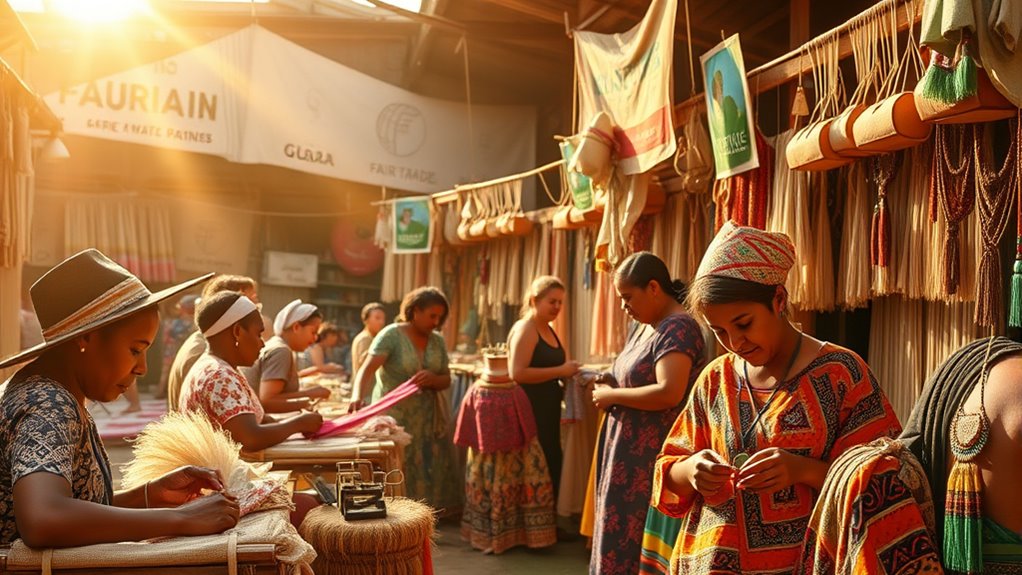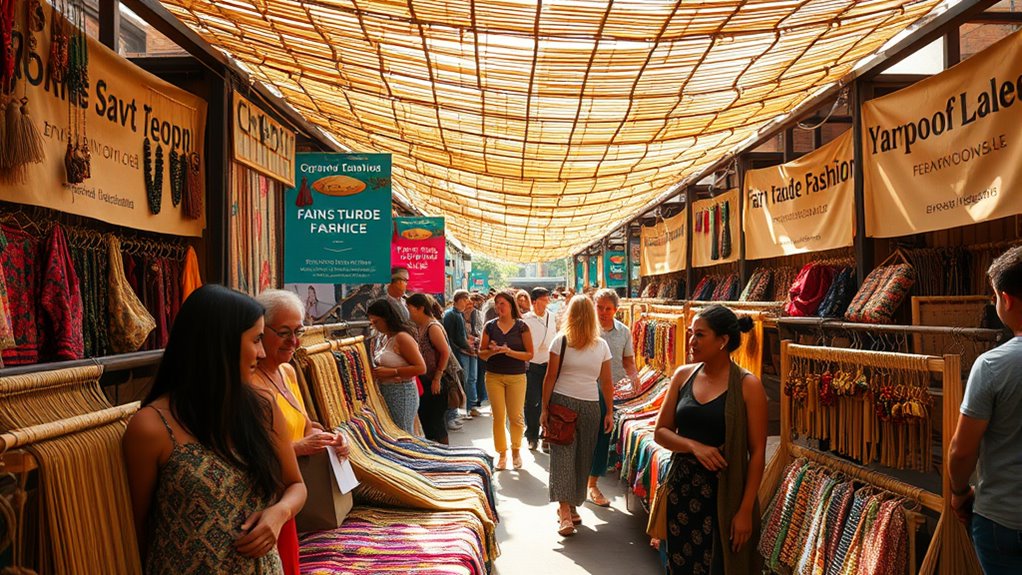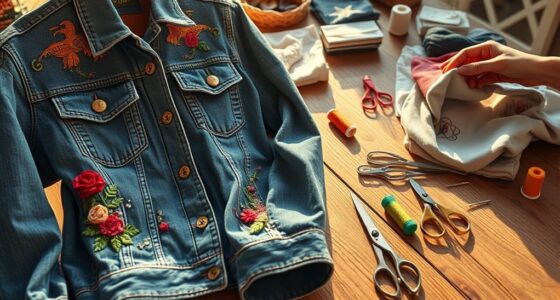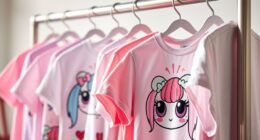You can be part of fashion’s fair-trade revolution by choosing brands committed to sustainability and ethical practices. This shift goes beyond food and drinks, focusing on sourcing eco-friendly materials like organic cotton and recycled fabrics, while ensuring fair wages and safe working conditions. Your conscious choices help promote transparency and encourage the fashion industry to embrace responsible manufacturing. To discover how your wardrobe impacts the world and what steps you can take next, continue exploring this empowering movement.
Key Takeaways
- The fashion industry is shifting toward fair-trade principles, emphasizing ethical sourcing and responsible manufacturing practices.
- Sustainable sourcing in fashion involves using organic, recycled, and eco-friendly materials to minimize environmental impact.
- Ethical production ensures fair wages, safe working conditions, and respect for human rights across supply chains.
- Industry transparency enables consumers to choose brands committed to sustainability and ethical practices, promoting accountability.
- Consumer activism in fashion drives brands to adopt fair-trade standards, fostering a more equitable and eco-conscious industry.

Have you ever wondered if your fashion choices can make a difference? It’s a question more people are asking as awareness around sustainability and ethics grows. The fashion industry has long been associated with fast fashion, environmental harm, and questionable labor practices. But a new movement is emerging—one that promotes fair-trade principles and responsible production methods. Instead of just focusing on what looks good, you can now consider how your clothing is made and where it comes from. This shift isn’t just about style; it’s about supporting a system built on sustainable sourcing and ethical production. When you choose brands committed to these principles, you actively participate in transforming the industry into a more equitable and environmentally friendly space.
Sustainable sourcing means that the raw materials used in your clothes are harvested in ways that minimize environmental impact and support local communities. Think about organic cotton, recycled fabrics, or sustainably harvested fibers. These choices help reduce water consumption, lower greenhouse gas emissions, and prevent pollution. By opting for brands that prioritize sustainable sourcing, you ensure that your wardrobe isn’t contributing to deforestation, water depletion, or harmful chemical use. It’s about making mindful decisions that align with your values and help preserve the planet for future generations. Incorporating vetted honey brands that emphasize transparent and responsible sourcing can serve as an example of how ethical practices extend beyond fashion.
Ethical production takes this a step further. It guarantees that the people involved in manufacturing your clothing are treated fairly, paid living wages, and work in safe conditions. When brands prioritize ethical production, they often audit their factories to ensure compliance with labor laws and human rights standards. This means that the workers behind your favorite garments aren’t exploited or forced into unsafe environments. Supporting these brands sends a message that you value human dignity and fair treatment, encouraging more companies to adopt responsible practices. It also helps break the cycle of poverty and inequality that plagues many low-wage countries involved in garment manufacturing.
Making conscious fashion choices isn’t just a trend; it’s a way to push the industry toward transparency and responsibility. By researching brands and their supply chains, you can choose those that prioritize both sustainable sourcing and ethical production. This awareness empowers you to be part of a larger movement that champions fair trade principles beyond coffee and chocolate, extending into every aspect of life—including your wardrobe. Every purchase becomes an act of advocacy, encouraging brands to adopt more sustainable and ethical practices. In this way, your fashion choices can truly make a difference, shaping a future where style and conscience go hand in hand.
Frequently Asked Questions
How Does Fair-Trade Certification Impact Clothing Durability?
Fair-trade certification can positively impact clothing durability by promoting the use of sustainable fiber, which is often stronger and more resistant to wear. When you choose fair-trade certified garments, you’re supporting practices that enhance garment longevity. Sustainable fibers and ethical manufacturing processes mean your clothes last longer, reducing waste. This certification encourages quality over quantity, so your wardrobe becomes more sustainable and durable over time.
Are Fair-Trade Fashion Brands Affordable for Everyday Consumers?
It’s no coincidence that fair-trade fashion brands often seem more affordable than you expect. When you do a price comparison, you’ll notice they focus on transparency, cutting out middlemen, and fair wages. These factors help keep costs reasonable, making ethical clothing accessible for everyday consumers. So, yes, fair-trade brands are increasingly affordable, especially when you prioritize brand transparency and understand the true value behind your purchase.
What Are the Environmental Benefits of Fair-Trade Fabrics?
Fair-trade fabrics offer significant environmental benefits. By supporting sustainable farming, they reduce harmful chemicals and water use, protecting ecosystems. Using eco-friendly dyes minimizes pollution and health hazards for workers. As you choose fair-trade fabrics, you’re helping promote environmentally responsible practices that conserve resources and reduce pollution. This switch to eco-conscious materials guarantees a healthier planet, making your fashion choices more sustainable and eco-friendly.
How Can Consumers Verify a Brand’S Fair-Trade Claims?
To verify a brand’s fair-trade claims, you should look for third-party verification labels that guarantee transparency standards are met. These certifications, like Fair Trade or GOTS, confirm that the brand adheres to ethical practices. You can also research the company’s transparency reports or visit their website to see if they openly share sourcing and manufacturing details. This helps you make informed choices and support truly fair-trade fashion.
What Challenges Do Fair-Trade Fashion Brands Face Globally?
They say “the devil is in the details,” and fair-trade fashion brands face big challenges worldwide. You might wonder about their supply chain transparency and how well consumers understand fair trade. These brands struggle with complex supply chains, ensuring fair wages, and maintaining consumer awareness. Overcoming these hurdles requires building trust and clear communication to prove their commitment to ethical practices in a competitive global market.
Conclusion
As you embrace fair trade in fashion, you champion transparency, support ethical producers, and demand sustainable practices. You challenge the status quo, change the industry’s future, and inspire others to follow. You see the power of your choices, the impact of your voice, and the importance of your actions. Together, you and fair trade can transform fashion into a force for good—ethical, sustainable, and fair. Your choices matter, your voice counts, and change begins with you.









